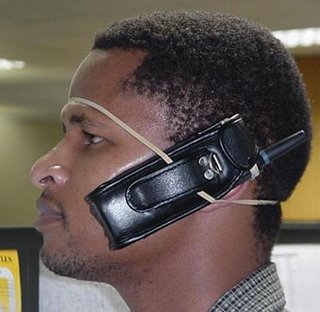 Image from College Boredom's 8 Reasons to Hate Cell Phones, which I don't, but c'mon now. Loud talkers or pablum and their faux-clever ringtones must be stopped.
Image from College Boredom's 8 Reasons to Hate Cell Phones, which I don't, but c'mon now. Loud talkers or pablum and their faux-clever ringtones must be stopped.This article about the new cell phones with fifty different media options show that some users are fed up, and just want a simple-to-use, reliable phone. Many of the added features include extra fees which incent the carriers to get you using them. They can all see that the iPod interface, for example, propelled its popularity way beyond other MP3 players, but they won't think about how to make phones more intuitive. I recently had to charge up the minutes on my phone, and I kept having to pull it away from my ear to locate the tiny buttons (1 for yes...) and wade through piles of annoying menus, and it's stupid that such rich devices are still so clumsy.
However, near the end of this article was the statement echoing exactly what I've been saying for years:
But Roger Entner of the market research firm Ovum said none of the major carriers impresses him. He says most of them are trying to replicate how people use personal computers instead of coming up with a new approach.
"What do (customers) do best on the phone? They talk. What do they do worst? Type. Why is every user interface based on typing?" Entner said. "Right now, the software developers take advantage of every weakness a device has and none of the strengths."
Get me a freaking voice-activated phone, with password and voice print security, so I can perform communication and information retrieval functions naturally and logically without octopus arms!

4 comments:
oh yes, the star trek communicator is still coming, but it's still a ways off, because voice recognition software turns out to be pretty hard to do. in the meantime, it's pretty funny to hear people complain about gadgets that are really f'ing incredible when you think about it. just a few years ago you couldn't do a damn thing with a cellphone - even make a decent call!
Okay, they're good devices, but my functional issues (and the lack of intuitive design involved) could have been addressed a decade ago. I used to work with commercial voice recognition software which, at that time, was way beyond deciphering a limited set of words, especially when not needing to recognize them from every motley incalling 1-800 customer, but was "trained" through repetition by the same one user or small set of users. The application we were supporting allowed doctors to dictate medical reports, et al, so the dictionaries were extensive and the transcription accurate.
I've flirted with several networks, but I still can't make a decent call while traveling through Trump Island (nor could I from Chicago) without dropouts and dropoffs.
I always laughed when the X-Files phones worked from some wolfman's underground lair or bat boy's cave. If I'm ever in dire need, I hope I've got a solid crobar and a first aid kit, in case my emergency call doesn't go through.
i've also wondered why they keep going down the PDA path. I'm sure it isn't because they haven't thought of it or wanted to do it differently - there's tons of VC money going into mobile technology these days (i'm kind of caught in that vortex myself) and everybody's talking about 'voice voice voice' but they all end up just doing 'text, text, text'. maybe it's just a combination of 'follow the money' and 'do what you know', and the intertia of the way things are.
I think there must be some of that phenomenon at work. We're used to type, even icons, and everyone seems to have this idea that you'll want your phone to totally replace your computer. Well, until it fits on my watchband and can pop up a reasonably-sized holographic screen before my eyes- perhaps to my implant- I'd be happy with a phone that worked more intuitively and reliably.
Post a Comment